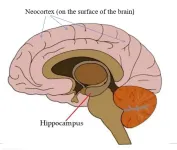(Press-News.org) Advisory Highlights:
A new American Heart Association presidential advisory identifies the strong connections among cardiovascular disease (CVD), kidney disease, Type 2 diabetes and obesity, and suggests redefining CVD risk, prevention and management.
The advisory defines cardiovascular-kidney-metabolic (CKM) syndrome for the first time.
CKM syndrome ranges from Stage 0, or no risk factors and an entirely preventive focus, to Stage 4, the highest-risk stage with cardiovascular disease. Stage 4 may also include kidney failure.
The advisory urges use of a new tool that will predict someone’s likelihood of heart attack, stroke and/or heart failure in 10 and 30 years.
Embargoed until 4 a.m. CT / 5 a.m. ET Monday, Oct. 9, 2023
DALLAS, Oct. 9, 2023 — Health experts are redefining cardiovascular disease (CVD) risk, prevention and management, according to a new American Heart Association presidential advisory published today in the Association’s flagship journal Circulation.
Various aspects of cardiovascular disease that overlap with kidney disease, Type 2 diabetes and obesity support the new approach. For the first time, the American Heart Association defines the overlap in these conditions as cardiovascular-kidney-metabolic (CKM) syndrome. People who have or are at risk for cardiovascular disease may have CKM syndrome.
The new approach detailed in the presidential advisory includes:
CKM syndrome stages ranging from 0, or no risk factors and an entirely preventive focus, to Stage 4, the highest-risk stage with established cardiovascular disease. Stage 4 may also include kidney failure. Each stage correlates to specific screenings and therapies.
Screening for and addressing social factors that impact health.
Collaborative care approaches among multiple specialties to treat the whole patient.
Suggested updates to the algorithm, or risk calculator, that helps health care professionals predict a person’s likelihood of having a heart attack or stroke. The update adds a risk prediction for heart failure, which estimates risk for “total cardiovascular disease” — heart attack, stroke and/or heart failure.
The writing group suggest the updated algorithm provide both 10- and 30-year cardiovascular disease risk estimates.
According to the American Heart Association’s 2023 Statistical Update, 1 in 3 U.S. adults have three or more risk factors that contribute to cardiovascular disease, metabolic disorders and/or kidney disease. CKM affects nearly every major organ in the body, including the heart, brain, kidney and liver. However, the biggest impact is on the cardiovascular system, affecting blood vessels and heart muscle function, the rate of fatty buildup in arteries, electrical impulses in the heart and more.
“The advisory addresses the connections among these conditions with a particular focus on identifying people at early stages of CKM syndrome,” said Chiadi E. Ndumele, M.D., Ph.D., M.H.S., FAHA, writing committee chair and an associate professor of medicine and director of obesity and cardiometabolic research in the division of cardiology at Johns Hopkins University in Baltimore. “Screening for kidney and metabolic disease will help us start protective therapies earlier to most effectively prevent heart disease and best manage existing heart disease.”
CKM syndrome is a consequence of the historically high prevalence of obesity and Type 2 diabetes in both adults and youth, according to the advisory. Type 2 diabetes and obesity are metabolic conditions — the “M” in CKM — that are also risk factors for cardiovascular disease. Moreover, the most common cause of death for people with Type 2 diabetes and chronic kidney disease is cardiovascular disease.
“We now have several therapies that prevent both worsening kidney disease and heart disease,” Ndumele said. “The advisory provides guidance for health care professionals about how and when to use those therapies, and for the medical community and general public about the best ways to prevent and manage CKM syndrome.”
With multiple conditions to manage, Ndumele noted fragmented care is a concern in treating patients with CKM syndrome, particularly for those with barriers to care. “The advisory suggests ways that professionals from different specialties can better work together as part of one unified team to treat the whole patient.” Additionally, the advisory emphasizes the importance of systematically screening for and addressing social factors that act as determinants, or drivers, of health, such as nutrition insecurity and opportunities for exercise, as key aspects of optimal CKM syndrome care.”
A companion article published with the presidential advisory, a new American Heart Association scientific statement, “A Synopsis of the Evidence for the Science and Clinical Management of Cardiovascular-Kidney-Metabolic (CKM) Syndrome,”, documents the evidence for the writing committee’s proposed approach. The scientific statement brings together evidence from current guidelines and large research studies and describes where gaps remain in knowledge needed to further improve CKM health.
CKM screening, stages and treatment
CKM-related screening is intended to detect cardiovascular, metabolic and kidney health changes early; identify social and structural barriers to care; and prevent progression to the next stage of CKM syndrome.
The advisory addresses care for adults. However, studies suggest CKM syndrome is progressive and begins early in life. Therefore, the advisory aligns with the American Academy of Pediatrics’ recommendations for children and youth to have annual assessments of weight, blood pressure, and mental and behavioral health, starting at age 3.
Stage 0 – No CKM risk factors. The goal at this stage is preventing CKM syndrome by achieving and maintaining ideal health based on the American Heart Association’s Life’s Essential 8 recommendations. The recommendations include healthy eating, physical activity and sleep habits; avoiding nicotine; and maintaining optimal weight, blood pressure, blood sugar and cholesterol levels. The advisory suggests screening adults in Stage 0 every three to five years to assess blood pressure, triglycerides, HDL (good) cholesterol and blood sugar.
Preventing unhealthy weight gain is important for CKM syndrome prevention because of the connection of obesity to Type 2 diabetes, high blood pressure and high triglycerides. At all stages, the advisory proposes yearly measurement of waist circumference and body mass index. Healthy lifestyle behaviors are also encouraged at every stage.
Stage 1 – Excess body fat and/or an unhealthy distribution of body fat, such as abdominal obesity, and/or impaired glucose tolerance or prediabetes. Support for healthy lifestyle changes (healthy eating and regular physical activity) and a goal of at least 5% weight loss in people with Stage 1 are suggested, with treatment for glucose intolerance if needed. Screening every two to three years is advised to assess blood pressure, triglycerides, cholesterol and blood sugar.
Stage 2 – Metabolic risk factors and kidney disease. Stage 2 includes people with Type 2 diabetes, high blood pressure, high triglycerides or kidney disease, and indicates a higher risk for worsening kidney disease and heart disease. The goal of care at this stage is to address risk factors to prevent progression to cardiovascular disease and kidney failure. Treatment may include medications to control blood pressure, blood sugar and cholesterol. In those with chronic kidney disease and in some people with Type 2 diabetes, SGLT2 inhibitors are advised to protect kidney function and reduce the risk of heart failure. SGLT2 inhibitors are a class of prescription medicines that are FDA-approved for use with diet and exercise to lower blood sugar in adults with Type 2 diabetes. Glucagon-like peptide 1 (GLP-1) receptor agonists are also suggested for consideration in people with Type 2 diabetes to help reduce high glucose, facilitate weight loss and reduce risk for CVD. Other therapies to prevent worsening kidney function are also advised. Screening suggestions for Stage 2 CKM syndrome align with AHA/ACC guidelines, which include yearly assessment of blood pressure, triglycerides, cholesterol, blood sugar and kidney function.
For those with increased risk of kidney failure based on kidney function assessments, more frequent kidney screening is recommended.
Stage 3 – Early cardiovascular disease without symptoms in people with metabolic risk factors or kidney disease or those at high predicted risk for cardiovascular disease. The goal of care in Stage 3 is to intensify efforts to prevent people who are at high risk of progressing to symptomatic cardiovascular disease and kidney failure. This may involve increasing or changing medications, and additional focus on lifestyle changes. The writing committee advises coronary artery calcium (CAC) measurement in some adults to assess narrowing of the arteries when treatment decisions are unclear. CAC screening is used to guide decisions about cholesterol-lowering statin therapy. Test results indicating asymptomatic heart failure should lead to intensified therapy to prevent heart failure symptoms.
The advisory also describes CKM syndrome regression, an important concept and public health message in which people making healthy lifestyle changes and achieving weight loss may regress to lower CKM syndrome stages and a better state of health. The best opportunity for patients to experience regression is in Stages 1, 2 and 3. Some may see improvements in glucose control, cholesterol and blood pressure levels, weight, kidney function and types of heart dysfunction.
Stage 4 – Symptomatic cardiovascular disease in people with excess body fat, metabolic risk factors or kidney disease. Stage 4 CKM syndrome is divided into two subcategories: (4a) for those without kidney failure or (4b) for those with it. In this stage, people may have already had a heart attack or stroke or may already have heart failure. They also may have additional cardiovascular conditions such as peripheral artery disease or atrial fibrillation. The goal of care is individualized treatment for cardiovascular disease with consideration for CKM syndrome conditions.
Predicting Risk
A critical step in assessing risk and managing CKM syndrome is updating the risk prediction algorithm to help health care professionals predict cardiovascular disease in a way that includes CKM components: cardiovascular disease, chronic kidney disease and metabolic disorders.
The Pooled Cohort Equation, the current risk calculator for atherosclerotic cardiovascular disease, established in 2013, estimates the risk of a heart attack or stroke in the next 10 years for people ages 40-75. It includes health and demographic factors about a person and is used to guide lifestyle recommendations and treatment decisions for people at risk for cardiovascular disease. The risk factors are age, sex and race (as white, Black and other); cholesterol levels; and systolic blood pressure. The equation also includes yes/no responses to whether a person is receiving treatment for high blood pressure Type 2 diabetes, or smokes cigarettes.
The advisory proposes updating the risk calculator to include measures of kidney function, Type 2 diabetes control (using blood test results instead of a yes/no response) and social determinants of health for a more comprehensive risk estimate. Kidney function assessments include a measure of how well the kidneys filter waste from the blood and urine albumin levels, a measure of how well the kidneys reabsorb protein. Individual health measures in addition to demographic information will allow the calculator to produce an individual’s total CVD risk estimate.
The writing group recommends the risk calculator updates be expanded to assess risk in people as young as age 30 and to calculate both 10- and 30-year CVD risk. More comprehensive CVD risk assessment at younger ages will allow for earlier preventive strategies to mitigate progression to advanced stages of CKM syndrome. In the long term, this will help to reduce gaps in treatment and health equity and improve outcomes.
Calls to Action
The advisory calls for systemic changes to optimize CKM health.
“There is a need for fundamental changes in how we educate health care professionals and the public, how we organize care and how we reimburse care related to CKM syndrome,” Ndumele said. “Key partnerships among stakeholders are needed to improve access to therapies, to support new care models and to make it easier for people from diverse communities and circumstances to live healthier lifestyles and to achieve ideal cardiovascular health.”
Investing in research is important for advancing CKM care. Key research gaps include:
better understanding the pathways leading to heart disease in CKM syndrome;
better understanding of why some people may advance more quickly along CKM stages, while others may progress more slowly; and
understanding the best way to use newer therapies with multiple effects on CKM syndrome, including to improve metabolic factors such as obesity and Type 2 diabetes, and to reduce worsening kidney disease and prevent heart disease.
Co-authors and their disclosures are listed in the manuscript.
This presidential advisory was prepared by the volunteer writing group on behalf of the American Heart Association. Presidential advisories and scientific statements promote greater awareness about cardiovascular diseases and stroke and help facilitate informed health care decisions. They outline what is known about a topic and what areas need additional research. While scientific statements and advisories inform the development of guidelines, they do not make treatment recommendations. American Heart Association guidelines provide official clinical practice recommendations.
The Association receives funding primarily from individuals. Foundations and corporations (including pharmaceutical, device manufacturers and other companies) also make donations and fund specific Association programs and events. The Association has strict policies to prevent these relationships from influencing the science content. Revenues from pharmaceutical and biotech companies, device manufacturers and health insurance providers, and the Association’s overall financial information are available here.
Additional Resources:
Available multimedia is on the right column of the news release link https://newsroom.heart.org/news/heart-disease-risk-prevention-and-management-redefined?preview=fd8230bbebab3e1f9144f5ee1d5f3308
After Oct. 9, view the presidential advisory and scientific statement online.
AHA news release: Simple blood test may predict future heart, kidney risk for people with Type 2 diabetes (August 2023)
AHA/ACC Clinical Guideline: Symptom relief and healthy habits are top goals for treating chronic heart disease (July 2023)
AHA news release: $150,000 awarded to research race in clinical algorithms (August 2023)
Follow AHA/ASA news on X (formerly Twitter) @HeartNews.
About the American Heart Association
The American Heart Association is a relentless force for a world of longer, healthier lives. We are dedicated to ensuring equitable health in all communities. Through collaboration with numerous organizations, and powered by millions of volunteers, we fund innovative research, advocate for the public’s health and share lifesaving resources. The Dallas-based organization has been a leading source of health information for nearly a century. Connect with us on heart.org, Facebook, X (formerly known as Twitter) or by calling 1-800-AHA-USA1.
###
END
Heart disease risk, prevention and management redefined
Interactions among obesity, Type 2 diabetes, chronic kidney disease and cardiovascular disease drive the new approach, says new American Heart Association presidential advisory
2023-10-09
ELSE PRESS RELEASES FROM THIS DATE:
Clinical trial demonstrates benefits of solriamfetol for adults with ADHD
2023-10-09
BOSTON – Although several medications are approved to treat attention-deficit/hyperactivity disorder (ADHD), some individuals experience limited benefits from the drugs or develop side effects from their use. A recent clinical trial published in the Journal of Clinical Psychiatry by investigators at Massachusetts General Hospital (MGH), a founding member of Mass General Brigham (MGB), has demonstrated that the drug solriamfetol may be an effective alternative for managing ADHD in adults.
Solriamfetol is currently approved in the United States for ...
Tropical ecosystems more reliant on emerging aquatic insects, study finds, potentially putting them at greater risk
2023-10-09
A team of researchers from Queen Mary University of London and the University of Campinas in Brazil has found that tropical forest ecosystems are more reliant on aquatic insects than temperate forest ecosystems and are therefore more vulnerable to disruptions to the links between land and water.
The study, published in the journal Ecology Letters, is the first to directly compare the interconnections between land and water in tropical and temperate environments via the emergence of aquatic insects. The researchers used a technique called stable isotope analysis to trace ...
Plate tectonic surprise: Utrecht geologist unexpectedly finds remnants of a lost mega-plate
2023-10-09
Utrecht University geologist Suzanna van de Lagemaat has reconstructed a massive and previously unknown tectonic plate that was once one-quarter the size of the Pacific Ocean. Her colleagues in Utrecht had predicted its existence over 10 years ago based on fragments of old tectonic plates found deep in the Earth’s mantle. Van de Lagemaat reconstructed lost plates through field research and detailed investigations of the mountain belts of Japan, Borneo, the Philippines, New Guinea, and New Zealand. To her surprise, she found that oceanic remnants on northern Borneo must have belonged to the long-suspected plate, which scientists have named Pontus. She has now reconstructed ...
Researchers identify largest ever solar storm in ancient 14,300-year-old tree rings
2023-10-09
An international team of scientists have discovered a huge spike in radiocarbon levels 14,300 years ago by analysing ancient tree-rings found in the French Alps.
The radiocarbon spike was caused by a massive solar storm, the biggest ever identified.
A similar solar storm today would be catastrophic for modern technological society – potentially wiping out telecommunications and satellite systems, causing massive electricity grid blackouts, and costing us billions of pounds.
The academics are warning of the importance ...
Should a more individualized model replace the current method for determining which people should be screened for lung cancer?
2023-10-09
A new study found that an alternative model to identify patients with lung cancer eligible for screening was more accurate than the currently used method based on the United States Preventive Services Task Force (USPSTF) criteria. The results are published by Wiley online in CANCER, a peer-reviewed journal of the American Cancer Society.
Lung cancer is the leading cause of cancer deaths, and using low-dose computed tomography scans to screen people who are at elevated risk for lung cancer reduces lung cancer deaths. The USPSTF criteria use age and smoking history to determine ...
Is this how antidepressants work, and why they take weeks to kick-in?
2023-10-09
Type of work: peer-reviewed/randomised controlled trial/people
SSRI antidepressants normally take a few weeks before any showing mental health benefits, but how come it takes so long? Now a study from a group of clinicians and scientists provides the first human evidence that this is due to physical changes in the brain leading to greater brain plasticity developing over the first few weeks of SSRI intake. This may also begin to explain one of the mechanisms of how antidepressants work.
This work is presented at the ECNP conference in Barcelona on 9th October. This ...
Teaching expectant mothers to bond with their babies
2023-10-09
Type of work: Peer-reviewed / experimental study / people
Up to a third of mothers don’t bond well with their babies after birth, causing intense emotional distress to both mother and baby1. Now researchers have found that they can train at-risk expectant mothers to recognise and regulate emotions better, potentially reducing their risk of postpartum depression.
Presenting the work at the ECNP Congress in Barcelona, researcher Dr Anne Bjertrup said:
People generally have an automatic tendency to see the positive or negative in any situation. In previous studies we saw that certain ...
Young children who are close to their parents are more likely to grow up kind, helpful and ‘prosocial’
2023-10-09
A loving bond between parents and their children early in life significantly increases the child’s tendency to be ‘prosocial’, and act with kindness and empathy towards others, research indicates.
The University of Cambridge study used data from more than 10,000 people born between 2000 and 2002 to understand the long-term interplay between our early relationships with our parents, prosociality and mental health. It is one of the first studies to look at how these characteristics interact over a long period spanning childhood and adolescence.
The researchers ...
The hidden scars: Stigmatization a major impact of skin diseases across Europe
2023-10-09
(Lugano, Monday, 9 October 2023) A major pan-European study has revealed that almost all patients affected by skin diseases face embarrassment, with the psychological burden compounding the physical impact of living with the disease.1,2
The Burden of Skin Disease in Europe, published today in the Journal of the European Academy of Dermatology and Venereology (JEADV), analysed 19,015 individuals with a range of skin diseases and revealed the huge psychological toll of living with a disease. The diseases examined included, amongst others, fungal skin infections, acne, atopic dermatitis (eczema), alopecia, psoriasis and sexually transmitted diseases (STDs).
With high levels of stigmatisation, ...
Discovery of invisible nutrient discharge on Great Barrier Reef raises concerns
2023-10-08
Scientists using natural tracers off Queensland’s coast have discovered the source of previously unquantified nitrogen and phosphorous having a profound environmental impact on the Great Barrier Reef.
The findings, published today in Environmental Science and Technology, indicate current efforts to preserve and restore the health of the Reef may require a new perspective.
Southern Cross University’s Dr Douglas Tait leads the ground-breaking study, ‘Submarine groundwater discharge exceeds river inputs as a source of nutrients to the Great Barrier Reef’.
Submarine ...
LAST 30 PRESS RELEASES:
Why does chronic back pain make everyday sounds feel harsher? Brain imaging study points to a treatable cause
Video messaging effectiveness depends on quality of streaming experience, research shows
Introducing the “bloom” cycle, or why plants are not stupid
The Lancet Oncology: Breast cancer remains the most common cancer among women worldwide, with annual cases expected to reach over 3.5 million by 2050
Improve education and transitional support for autistic people to prevent death by suicide, say experts
GLP-1 drugs like Ozempic could cut risk of major heart complications after heart attack, study finds
Study finds Earth may have twice as many vertebrate species as previously thought
NYU Langone orthopedic surgeons present latest clinical findings and research at AAOS 2026
New journal highlights how artificial intelligence can help solve global environmental crises
Study identifies three diverging global AI pathways shaping the future of technology and governance
Machine learning advances non targeted detection of environmental pollutants
ACP advises all adults 75 or older get a protein subunit RSV vaccine
New study finds earliest evidence of big land predators hunting plant-eaters
Newer groundwater associated with higher risk of Parkinson’s disease
New study identifies growth hormone receptor as possible target to improve lung cancer treatment
Routine helps children adjust to school, but harsh parenting may undo benefits
IEEE honors Pitt’s Fang Peng with medal in power engineering
SwRI and the NPSS Consortium release new version of NPSS® software with improved functionality
Study identifies molecular cause of taste loss after COVID
Accounting for soil saturation enhances atmospheric river flood warnings
The research that got sick veterans treatment
Study finds that on-demand wage access boosts savings and financial engagement for low-wage workers
Antarctica has lost 10 times the size of Greater Los Angeles in ice over 30 years
Scared of spiders? The real horror story is a world without them
New study moves nanomedicine one step closer to better and safer drug delivery
Illinois team tests the costs, benefits of agrivoltaics across the Midwest
Highly stable self-rectifying memristor arrays: Enabling reliable neuromorphic computing via multi-state regulation
Composite superionic electrolytes for pressure-less solid-state batteries achieved by continuously perpendicularly aligned 2D pathways
Exploring why some people may prefer alcohol over other rewards
How expectations about artificial sweeteners may affect their taste
[Press-News.org] Heart disease risk, prevention and management redefinedInteractions among obesity, Type 2 diabetes, chronic kidney disease and cardiovascular disease drive the new approach, says new American Heart Association presidential advisory





